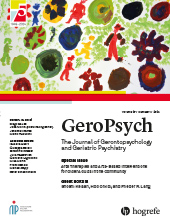Memory Rehabilitation Techniques for People with Early-Stage Dementia
Gedächtnisrehabilitation bei Frühdemenz
Abstract
Summary: Errorless learning (EL) can be supported through a variety of specific learning methods, which may vary along other parameters including for example the degree of effortful processing required. In memory rehabilitation for people with early-stage Alzheimer's disease (AD), achieving the optimal balance between elimination of errors and active, effortful processing during learning is likely to be critical. This paper describes a comparison of four different errorless methods in a single case experimental design. The participant, who had a diagnosis of early-stage AD, attempted to relearn forgotten face-name associations using one of four methods: Spaced retrieval, mnemonic elaboration, cueing with increasing assistance, and cueing with decreasing assistance. Best results were achieved in the mnemonic and cueing with increasing assistance conditions, while cueing with decreasing assistance produced the least learning. It is suggested that, within an errorless learning paradigm, strategies requiring more effortful processing may produce superior gains compared to strategies relying on implicit or passive processing. This has important implications for clinical rehabilitation interventions for people with early-stage dementia.
Zusammenfassung: Das fehlervermeidende Lernen (errorless learning) kann durch eine Reihe von spezifischen Lernmethoden, die sich im Hinblick auf verschiedene Parameter unterscheiden, unterstützt werden. Es ist zu erwarten, dass in der Gedächtnisrehabilitation mit Personen in frühen Stadien der Alzheimer Demenz (AD) ein optimales Gleichgewicht zwischen der Elimination von Fehlern einerseits und aktiver, elaborierter Verarbeitung andererseits, eine entscheidende Rolle spielt. Vier verschiedene Methoden des fehlervermeidenden Lernens wurden durch eine experimentelle Einzelfallanalyse verglichen. Der Studienteilnehmer versuchte Gesichter-Namen-Assoziationen wieder zu erlernen. Angewandt wurden Wiederholen nach ansteigenden Zeitintervallen, Mnemotechniken, Erinnerungshilfen mit zunehmender Unterstützung, und Erinnerungshilfen mit abnehmender Unterstützung. Beste Ergebnisse wurden durch die Anwendung von Mnemotechniken und Erinnerungshilfen mit zunehmender Unterstützung erzielt, während Erinnerungshilfen mit abnehmender Unterstützung zu den schlechtesten Lernerfolgen führten. Diese Ergebnisse deuten an, dass Strategien, die mehr Elaboration erfordern, zu besseren Lernerfolgen führen. Dies hat wichtige Implikationen für die klinische Rehabilitation in frühen Demenzstadien.
References
(1992). Memory training and memory improvement in Alzheimer's disease: Rules and exceptions.. Acta Neurologica Scandinavica, Supplement 139, 84– 89
(1996). Utilizing compensatory task conditions for episodic memory in Alzheimer's disease.. Acta Neurologica Scandinavica, Supplement 165, 109– 113
(1994). When implicit learning fails: Amnesia and the problem of error elimination.. Neuropsychologia, 32, 53– 68
(1989). Facilitation of new learning in Alzheimer's disease.. In G. Gilmore, P. Whitehouse & M. Wykle (Eds.), Memory and aging: Theory, research and practice (pp. 212-225). New York: Springer.
(2000). Retrieval strategies as a rehabilitation aid for cognitive loss in pathological aging.. In R.D. Hill, L. Backman & A.S. Neely (Eds.), Cognitive rehabilitation in old age (pp. 224-248). Oxford: Oxford University Press.
(2003). Rehabilitation for people with dementia.. In B.A. Wilson (Ed.), Neuropsychological rehabilitation: Theory and practice (pp. 197-215). London: Swets & Zeitlinger.
(1999). Errorless learning of face-name associations in early Alzheimer's disease.. Neurocase, 5, 37– 46
(2000). Intervening with everyday memory problems in early Alzheimer's disease: An errorless learning approach.. Journal of Clinical and Experimental Neuropsychology, 22, 132– 146
(2001). Long-term maintenance of treatment gains following a cognitive rehabilitation intervention in early dementia of Alzheimer type: A single case study.. Neuropsychological Rehabilitation, 11, 477– 494
(2002). Relearning of face-name associations in early-stage Alzheimer's disease.. Neuropsychology, 16, 538– 547
(1997). The pre-exposure technique: A novel method for enhancing the effects of imagery in face-name association learning.. Neuropsychological Rehabilitation, 7, 195– 214
(1975). “Mini-mental state”: A practical method for grading the cognitive state of patients for the clinician.. Journal of Psychiatric Research, 12, 189– 198
(1986). Learning and retention of computer-related vocabulary in memory impaired patients: Method of vanishing cues.. Journal of Clinical and Experimental Neuropsychology, 8, 292– 312
(1996). Identification of famous names and famous faces in early Alzheimer's disease: Relationship to anterograde episodic and general semantic memory.. Brain, 119, 111– 128
(1995). On the acquisition of new declarative knowledge in amnesia.. Behavioral Neuroscience, 109, 1027– 1044
(1987). Imagery mnemonic training in a patient with primary degenerative dementia.. Psychology and Aging, 2, 204– 205
(1998). Are the benefits of errorless learning dependent on implicit memory?. Neuropsychologia, 36, 25– 36
(1992). The use of errorless learning procedures in teaching people with a learning disability: A critical review.. Mental Handicap Research, 5, 204– 212
(2000). Errorless and effortful processes involved in the learning of face-name associations by patients with alcoholic Korsakoff's syndrome.. Neuropsychological Rehabilitation, 10, 113– 208
(2000). Guidelines for the selection of a method of fading cues.. Neuropsychological Rehabilitation, 10, 133– 149
(1988). Nonparametric statistics for the behavioral sciences (2 ed.).. New York: McGraw Hill.
(1995). Learning of face-name associations in memory impaired patients: A comparison of different training procedures.. Journal of the International Neuropsychological Society, 1, 29– 38
(2002). Errorless learning in memory impairment: Underlying mechanisms and enhancing its benefits. . Unpublished PhD, University of Sussex, Brighton, UK.
(1987). Single-case experimental designs in neuropsychological rehabilitation.. Journal of Clinical and Experimental Neuropsychology, 9, 527– 544
(1994). Errorless learning in the rehabilitation of memory impaired people.. Neuropsychological Rehabilitation, 4, 307– 326
(2001). Does errorless learning work through implicit or explicit memory? . Paper presented at the 29th Annual Meeting of the International Neuropsychological Society, Chicago, February 14-17.
(1996). Error-free learning in the rehabilitation of people with memory impairments.. Journal of Head Trauma Rehabilitation, 11, 54– 64


